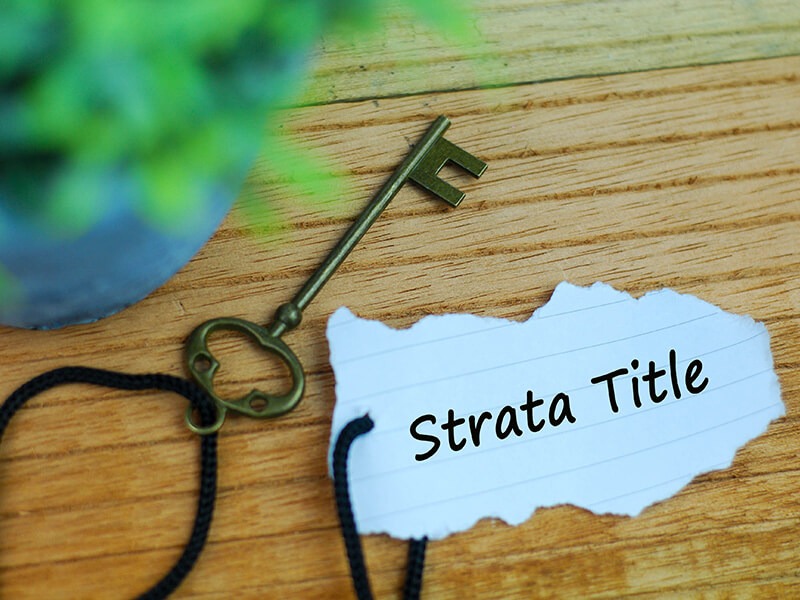The term “strata” is widely used in the property industry but can be confusing for the uninitiated. Read on to discover all you need to know about strata.
What exactly is strata?
Th word “strata” is basically a shorthand term for a multi-level building and refers to the fact that apartments or units are generally located on different levels, or “strata”.
Strata title is a form of ownership structure specifically for multi-level apartment blocks and horizontal subdivisions which include shared areas. A strata title scheme refers to a building or complex that has been divided into lots, such as individual units or apartments. This concept allows individual ownership of part of the whole property (the individual lot), coupled with shared ownership in the rest of the property (known as common property). Each individual apartment or unit is owned by a lot owner, while the common property in the scheme is owned by a collective group of owners as a whole. The scheme is managed by a legal entity known as a body corporate. The body corporate is responsible for ensuring that management of the property is carried out appropriately.
Common property in a strata scheme can include:
- Pools
- Gyms
- Stairwells
- Gardens
- Roofs
- Driveways
- Car parks
- Entrances and lobbies
- Lifts
- Courtyards
- Post boxes
So, what this means, is that when you buy a unit or apartment, you also buy part of a strata title. As well as owning your own individual lot, you will also own part of the building and its facilities and common areas. This ownership is not literal (for example, you don’t own one tenth of the driveway) but rather theoretical. Each owner owns a relatively equal portion of every part of the common property and has an equal right to use it. (It’s only relatively equal as usual procedure grants a larger proportion of common property to owners with a larger apartment or unit.) Together as a group of owners, you are responsible for the maintenance and upkeep of the common areas of the complex. You alone are responsible for your own unit or apartment.
Strata schemes provide the opportunity for community living without the work involved in owning your own freestanding property. Strata communities are becoming more and more common in Australian cities, where the availability of land is decreasing. Strata title schemes allow more people to fit into a smaller area than the ownership of individual houses.
Strata title schemes are not just for housing either. There are a variety of developments that can exist under strata title, including:
- Residential
- Commercial
- Retail
- Retirement villages
- Serviced apartments
- Resorts
- Caravan parks
- Even vineyards!
The history of strata
The concept of strata title is practiced worldwide, but did you know that it started here in Australia in 1961? The term “strata title” was first introduced in New South Wales as a way to handle the legal ownership of apartment blocks. The New South Wales Parliament first used the term when they passed the Conveyancing (Strata Titles) Act of 1961.
Before this landmark event, ownership of single apartments or units within a larger complex was clumsy, inconvenient and unmanageable, and did not confer separate ownership on individual occupants. This led to banks and lending institutions becoming increasingly reluctant to lend money to people looking to buy units or apartments, and interest rates were generally higher than for houses.
To solve these problems, the New South Wales government devised the first version of strata title, making it easier to borrow money for apartment or unit ownership. This new strata title concept was gradually adopted by other Australian states, and eventually by many other countries, including New Zealand, Canada, Indonesia and Singapore (to name only a few).
There are now more than 270,000 strata schemes operating Australia-wide, which encompass well over two million individual lots.
Benefits of buying a strata property
- Strata properties usually cost less to buy than freestanding houses
- Strata properties are usually easier to sell as the demand is fairly consistent
- You can outsource the task of building repair and maintenance
- Strata will often give you more affordable access to shared amenities such as pools, gyms and community centres
- You’ll become part of a close-knit community
- Strata properties are often equipped with additional safety features, meaning that security is higher
- You’ll usually need to pay a fraction of the council rates and local service fees with a strata property
- Insurance costs will likely be lower
- Your property assets are enhanced through the application of by-laws
How does strata work in practice?
Owning a strata property is somewhat different than owning a freestanding house. For starters, each strata scheme operates under by-laws – a set of rules unique to each scheme that govern the behaviour of owners and residents. By-laws cover such things as:
- Pets
- Noise
- Vehicles and parking
- Appearance of a lot
- Damage to common property
- Rubbish and garbage disposal
- Behaviour of invitees
- Storage of bulky items
The body corporate has the power to set its own by-laws (subject to certain limitations) and lot owners and occupants must abide by them. All owners must seek permission from the body corporate before making significant structural changes to their own lot, or before making any changes to common property.
Owners in a strata scheme will also be required to pay levies – fees which go towards covering the expenses incurred by running the building. The body corporate sets a projected budget, covering what they can reasonably foresee will need attention in the near future. Each owner is then charged a proportional share of the cost. In return, the body corporate will handle the upkeep and management of the building on behalf of all the owners.
Do strata schemes operate in the same way throughout Australia?
No, they don’t. Each state operates under its own specific strata legislation which may not apply in other states. The terminology used and regulations may be different from state to state as well.
When hiring a strata professional, it’s important to get advice that’s specific to your state. For the best strata mangers in Queensland, with vast expert local knowledge and experience, contact Capitol here






 What is common property in a body corporate?
What is common property in a body corporate?